At Volpis, we’ve hired dozens of Swift developers and helped product teams launch everything from MVPs to large-scale logistics apps. The difference between a good iOS developer and one who actually drives a product forward? It’s never just about the code.
Hard skills create apps. Soft skills ship the product.
Regularly ranked among the top custom app development companies on Clutch, our team at Volpis has spent years providing Swift development services to businesses worldwide. In this guide, we’ll share the top qualities we evaluate when hiring Swift developers — and why they’re essential to building fast, scaling smart, and avoiding costly mistakes.
Top 9 traits to look for when hiring a Swift developer
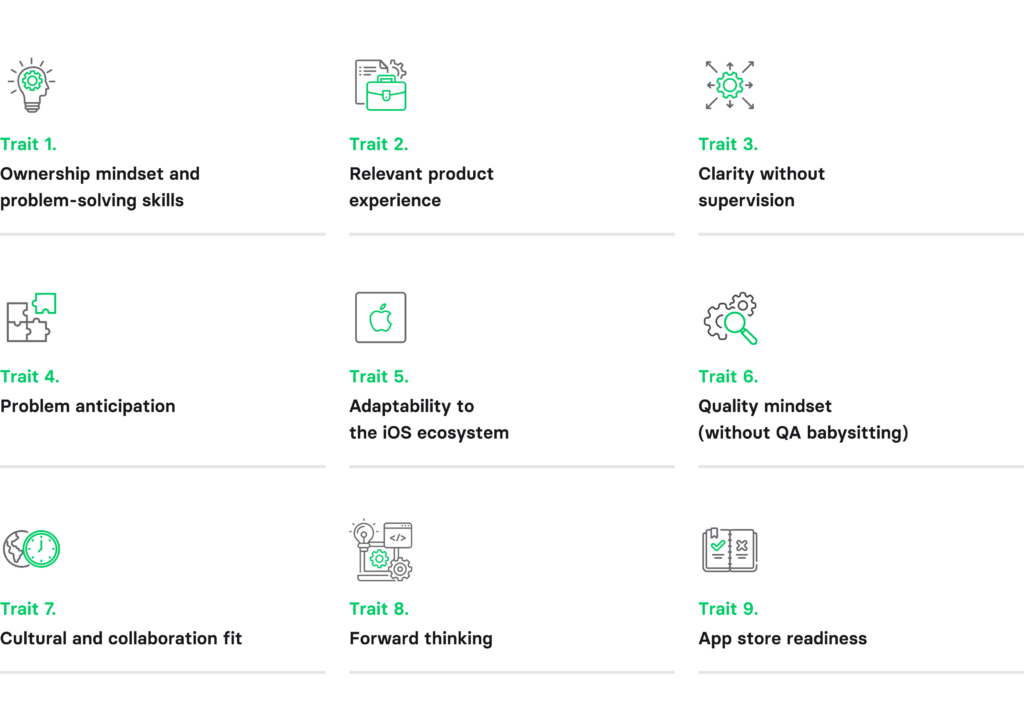
Let’s examine the key qualities of a Swift developer.
1. Ownership mindset and problem-solving skills
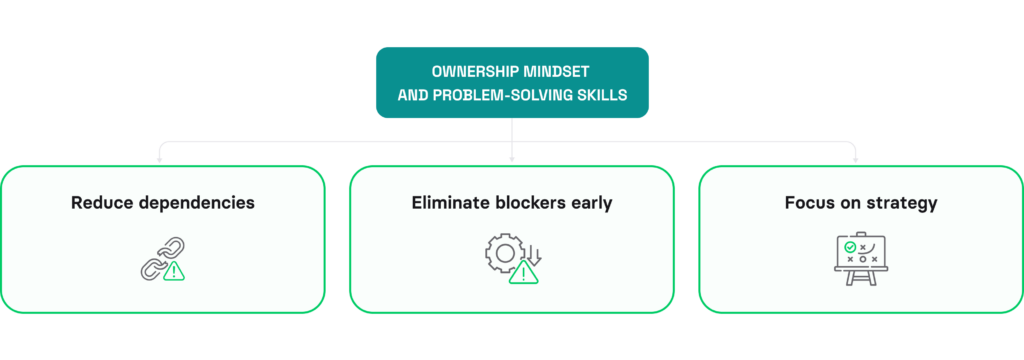
Some app developers wait for direction. The best ones take initiative — they clarify requirements, flag blind spots, solve complex problems and keep momentum without being micromanaged. They don’t just complete tickets — they think like product owners. They ask the hard questions early, raise concerns that no one anticipated, and act in the interest of the product, not just the codebase. Ownership shows up in how they communicate progress, request feedback, and work through ambiguity.
Why it’s important: Developers who take ownership reduce dependencies, eliminate blockers early, and free up your team to focus on strategy instead of chasing delivery.
2. Relevant product experience

Previous projects reveal more than resumes. Developers who’ve shipped real-world mobile apps — especially those involving real-time data, offline behavior, or performance constraints — have deep understanding of how to make decisions that hold up under pressure. Look for experience with app deployment cycles, user feedback loops, and scaling. Not all experience is equal — launching a weather app isn’t the same as supporting a fleet-tracking system that runs 24/7.
Why it’s important: Contextual experience means faster onboarding, fewer avoidable mistakes, and smarter trade-offs at every phase of iOS app development.
3. Clarity without supervision

Great Swift developers don’t get stuck when the Jira ticket lacks detail. They ask the right questions, identify edge cases, and offer solutions before scope confusion derails the sprint. They have the product sense and technical aptitude to make smart micro-decisions & solve coding challenges independently, as well as the communication skills to confirm those choices when needed. In app development projects without a full-time BA, designer or product managers, this ability becomes a true force multiplier.
Why it’s important: When your BA or PO isn’t available 24/7, you need someone who can keep shipping — not wait on answers.
4. Problem anticipation

Every product hits surprises — broken APIs, inconsistent designs, third-party failures. What matters is how your iOS developer responds. The best ones spot issues early and propose better paths forward before problems snowball. They test assumptions, look ahead to integration risks, and raise technical debt concerns before they accumulate. Problem anticipation is the difference between predictable delivery and firefighting.
Why it’s important: Anticipating problems avoids fire drills, protects timelines, and keeps teams focused on progress — not damage control.
5. Adaptability to the iOS ecosystem
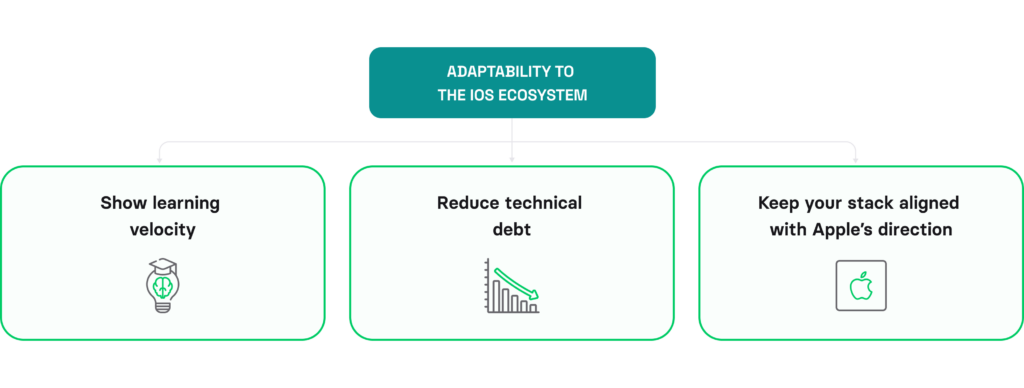
The Swift programming language evolves fast. Apple rewrites the rules annually. SwiftUI, Combine, and async/await all changed the game. Your dev needs to keep up — or you’ll fall behind. A strong candidate shows learning velocity, not just a list of what they know today. They follow WWDC, read Apple’s technical notes, and experiment with new APIs. Adaptability also shows in how they approach unknowns — are they blocked, or do they explore and adapt?
Why it’s important: Adaptable developers reduce technical debt and keep your stack aligned with Apple’s direction — not stuck in the past.
6. Quality mindset (without QA babysitting)
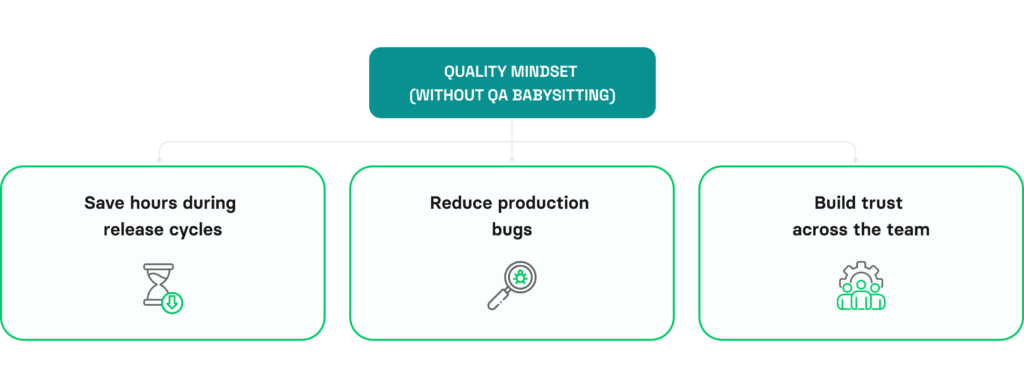
Testing isn’t something you tack on. Strong Swift developers own their code quality — they write tests, validate edge cases, and minimize the load on your QA team. They understand that quality isn’t just about preventing crashes — it’s about delivering confidence. This means covering business logic with XCTests, automating key UI flows, employing debugging tools and using analytics or crash reporting to close the loop post-release.
Why it’s important: A quality-focused dev saves hours during release cycles, reduces production bugs, and builds trust across the team.
7. Cultural and collaboration fit
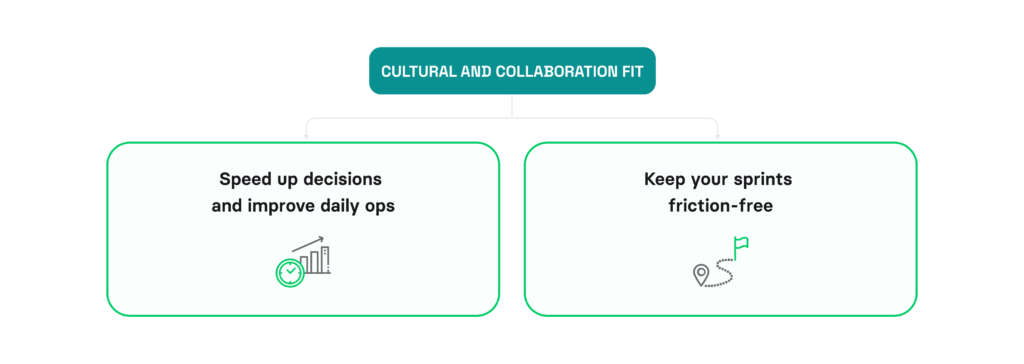
Brilliant app developers still fail if they don’t collaborate. Clear async communication, timezone overlap, and proactive responsibility all matter as much as clean code. A developer who can summarize blockers in Slack, leave thoughtful comments in Git, and sync with QA or design without friction will always deliver faster. Collaboration isn’t soft — it’s a multiplier for velocity and morale.
Why it’s important: Good team fit speeds up decisions, improves daily ops, and keeps your sprints friction-free — especially in remote or hybrid setups.
8. Forward thinking
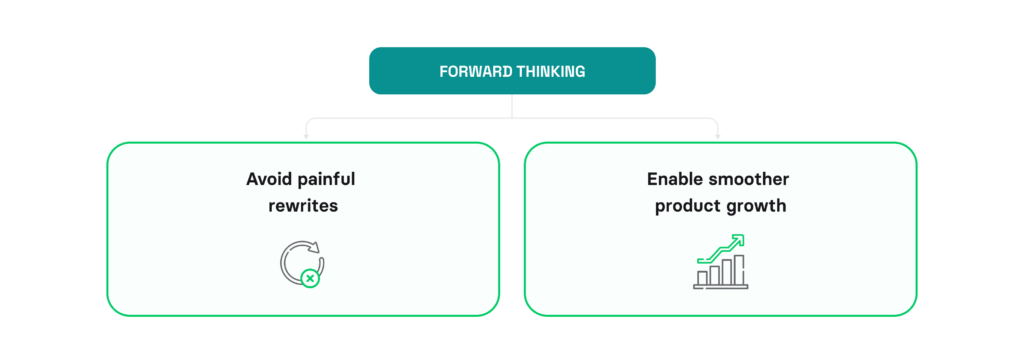
You’re not just building for today. The best Swift developers write code that scales — considering future teammates, new features, and performance under load. They plan for extensibility, write documentation, and refactor preemptively. They don’t just solve the ticket — they ask, “What happens next quarter when we double usage?”
Why it’s important: App developers who plan ahead help you avoid painful rewrites and enable smoother product growth without re-architecture every few months.
9. App store readiness
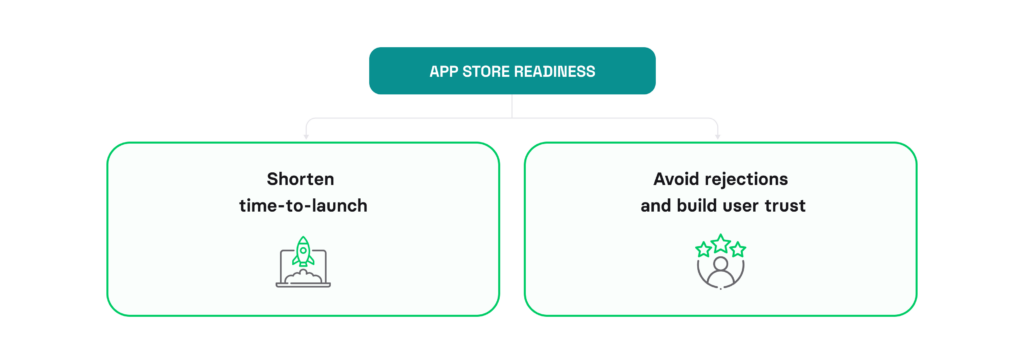
Getting approved by Apple isn’t guaranteed. Developers who have solid understanding of App Store guidelines — privacy rules, design standards, and submission gotchas — build with compliance in mind, not panic at the end. They’ve handled rejections before. They know about ATT, background location warnings, minimum performance thresholds, and legal disclosures. This mindset drastically reduces your launch risk.
Why it’s important: App Store-ready code shortens time-to-launch, avoids rejections, and builds user trust from day one.
How Swift developers at Volpis create custom apps with over a million downloads
The Volpis team has been leveraging the power of Swift to build robust iOS applications and assist business owners in achieving unparalleled milestones. One recent example is the Holy Quran app.

The Holy Quran is a popular non-profit Android and iOS app. The app’s main objective is to provide accurate knowledge about Islam and serve as a platform for studying the Quran. A few years ago, the app needed significant updates.
Our team focused on performance optimization, backend maintenance, user interface design and ensuring seamless user experience across different devices
The app has become a trusted resource for the Muslim community and those interested in Islam. Today, the app has a 4.8-star rating, over 11,000 reviews and has surpassed 1 million downloads.
Hire mindset, not just skillset
At Volpis, we’ve seen firsthand how soft skills quietly decide the success of every project.
Ownership. Clarity. Foresight. Communication. These aren’t buzzwords — they’re what makes your Swift developer a product partner, not a ticket-taker.
If you need someone who codes clean and thinks like a product owner, we would be happy to answer all your questions and give honest advice. Consistently recognized as one of the Top Custom Software Development Companies on Clutch, our team at Volpis have rich experience in designing and developing applications with Swift.

Read more reviews from our valuable customers on Clutch
Volpis builds high-trust native iOS teams — from Swift devs to BAs to QA — who are ready to deliver from day one. We invite you to explore our portfolio for a detailed look at the apps we have developed for our clients.
If you need to hire skilled Swift developers, you can reach out to us via info@volpis.com with any questions or to explore how we can be part of your journey.
Hire experienced and reliable Swift developers today
We would be happy to answer all your questions and help make your project a total win!
FAQs
How do you validate that a Swift developer can help ensure a mobile app runs smoothly across different Apple devices?
To validate this, ask how the developer approaches device fragmentation during development. Experienced Swift developers should mention using the Xcode IDE and Simulator tools to preview and test layouts across various screen sizes. They should also highlight techniques like Auto Layout and Size Classes to ensure adaptive UI, and explain how they optimize performance for both newer and older Apple devices using profiling tools like Instruments. Ask: “Can you walk me through how you build and test Swift apps to ensure smooth performance and consistent layout across different Apple devices?”
What role does unit testing play in iOS development, and should I expect it from every Swift developer?
Yes — Swift developers should understand and apply unit testing, especially for business logic, data handling, and critical features. Tools like XCTest help catch regressions early, reduce QA cycles, and support confident refactoring as the codebase grows. However, not all tests are equal — a strong Swift developer knows what to test, what to mock, and how to structure tests for maintainability. While 100% coverage isn’t realistic, a developer with a quality mindset will build with testability in mind from the start. Ask: “What parts of your code do you usually write unit tests for, and how do you decide what’s worth testing?”
How do I evaluate a Swift developer’s ability to work in a fast-paced product environment?
Ask about times they shipped features under tight deadlines or when priorities shifted suddenly. Look for signs they stayed focused, communicated clearly, and made smart compromises. Developers who thrive in fast-paced settings usually show a mix of calm urgency and product-first thinking.
Should I prioritize SwiftUI experience over UIKit in 2026?
If you’re building a new app, SwiftUI should be a core requirement — it’s Apple’s future. But UIKit is still critical for legacy codebases or custom UI components. A great hire balances both, understands where each shines, and can bridge them confidently depending on your product stage and tech stack.
How can I tell if a Swift developer understands business impact, not just code?
During interviews, ask how they measure success beyond “the app runs.” Strong candidates talk about user outcomes, product KPIs, and how their work affected activation, retention, or performance. Developers who understand business impact naturally align their decisions with your company goals.
How do I know if I’m hiring the right Swift developer with the technical expertise, knowledge, and problem-solving skills my product needs?
The right Swift developer shows in-depth understanding of iOS architecture, strong technical expertise, and the ability to solve real-world challenges — not just write code. Look for problem-solving skills in past projects, not just app features, to ensure you’re hiring someone who can scale with your product.






